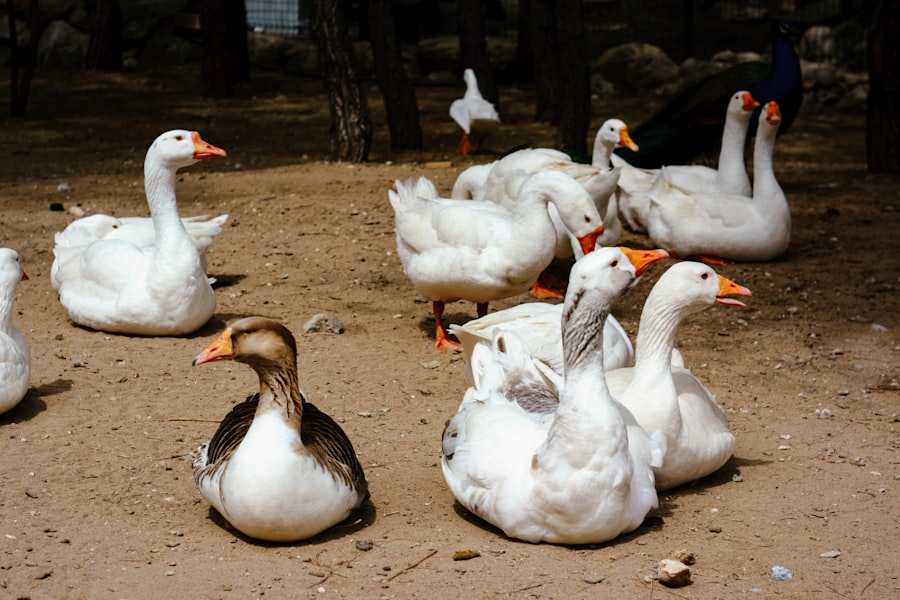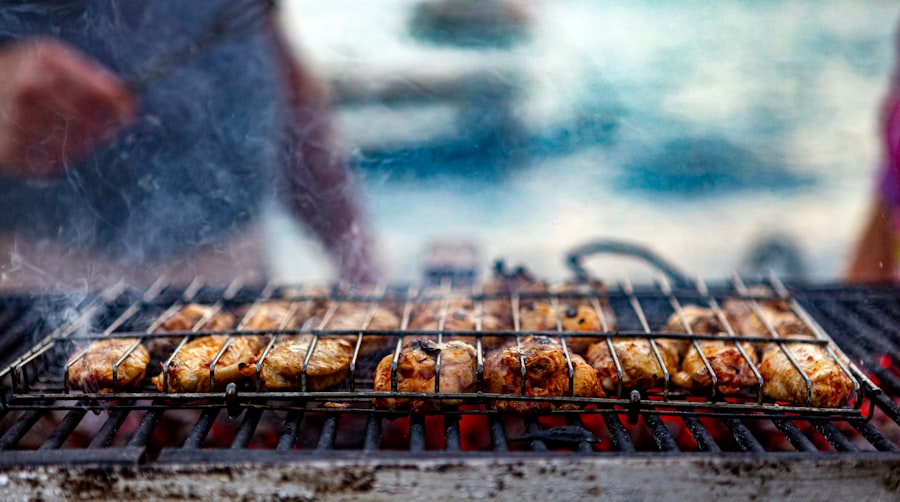Marek’s disease is a highly contagious viral disease affecting poultry, particularly chickens. It is caused by the Marek’s disease virus (MDV), a member of the herpesvirus family. The virus spreads through dander, feather follicles, and respiratory secretions of infected birds.
Once present, the virus can persist in the environment for extended periods, making eradication challenging. Primarily affecting young chickens between 12 and 25 weeks of age, Marek’s disease can cause tumors in the nerves, skin, and internal organs. It may also lead to paralysis, blindness, and immunosuppression, increasing susceptibility to other infections.
The disease can have devastating effects on poultry flocks, resulting in significant economic losses for producers. Marek’s disease is a major concern for the poultry industry due to its rapid spread within flocks, leading to high morbidity and mortality rates. It can also decrease egg production and impair growth rates in affected birds.
The presence of Marek’s disease in a flock may limit export opportunities for poultry products, as many countries have strict regulations regarding the importation of poultry from areas with a history of the disease. Understanding Marek’s disease and its implications is crucial for implementing effective prevention and control measures. Poultry producers must employ robust biosecurity measures and disease prevention strategies to protect their flocks and maintain the profitability of their operations.
Table of Contents
- 1 The Importance of Turkeys in Protecting Chickens from Marek’s Disease
- 2 Selecting the Right Turkey Breed for Disease Protection
- 3 Integrating Turkeys into Your Flock for Disease Prevention
- 4 Providing Proper Care and Nutrition for Turkeys
- 5 Monitoring and Managing Marek’s Disease in Your Flock
- 6 Seeking Veterinary Assistance for Marek’s Disease Prevention and Treatment
- 7 FAQs
- 7.1 What is Marek’s disease?
- 7.2 How can keeping a turkey help protect chickens from Marek’s disease?
- 7.3 What are some other benefits of keeping a turkey with chickens?
- 7.4 Are there any drawbacks to keeping turkeys with chickens?
- 7.5 What are some tips for successfully keeping turkeys with chickens?
Key Takeaways
- Marek’s Disease is a highly contagious viral disease that affects chickens and other poultry, causing tumors, paralysis, and death.
- Turkeys can play a crucial role in protecting chickens from Marek’s Disease by acting as natural hosts for the virus, preventing its spread to chickens.
- When selecting a turkey breed for disease protection, consider breeds known for their resistance to Marek’s Disease, such as the Midget White or Beltsville Small White.
- Integrating turkeys into your flock can help prevent Marek’s Disease by reducing the overall viral load and providing a natural barrier to its spread.
- Proper care and nutrition for turkeys, including a balanced diet, clean living conditions, and regular health checks, are essential for maintaining their disease resistance and overall well-being.
The Importance of Turkeys in Protecting Chickens from Marek’s Disease
Creating a Buffer Against the Spread of Marek’s Disease
By introducing turkeys into a chicken flock, poultry producers can create a buffer against the spread of the virus, as turkeys act as “sentinels” that can help control the transmission of Marek’s disease. Additionally, turkeys can help reduce the environmental load of the virus by preying on insects and mites that may carry the virus, further contributing to the protection of chickens from Marek’s disease.
Indirect Benefits of Turkeys in Protecting Chickens
The presence of turkeys in a mixed poultry flock can also provide indirect benefits in protecting chickens from Marek’s disease. Turkeys are known for their strong immune systems and resistance to various pathogens, which can help create a healthier environment for chickens. By reducing the overall pathogen load in the environment, turkeys can contribute to improving the overall health and well-being of the entire poultry flock.
Controlling Insect Populations and Disease Transmission
Furthermore, turkeys are effective at controlling insect populations, which can serve as vectors for various poultry diseases, including Marek’s disease. By keeping insect populations in check, turkeys can help minimize the risk of disease transmission within the flock. Overall, the inclusion of turkeys in a mixed poultry flock can be an effective strategy for protecting chickens from Marek’s disease and promoting overall flock health.
Selecting the Right Turkey Breed for Disease Protection

When selecting turkeys for inclusion in a mixed poultry flock for disease protection, it is essential to choose breeds that are well-suited for this purpose. Not all turkey breeds exhibit the same level of resistance to pathogens, so selecting the right breed is crucial for maximizing the protective benefits for chickens. One popular choice for disease protection is the heritage breed of turkey, known for its hardiness and natural resistance to diseases such as Marek’s disease.
Heritage turkey breeds, such as Bourbon Red, Narragansett, and Standard Bronze, have been bred for their ability to thrive in outdoor environments and resist various pathogens, making them ideal candidates for protecting chickens from Marek’s disease. Another important consideration when selecting turkey breeds for disease protection is their compatibility with chickens in a mixed flock setting. Some turkey breeds may be more aggressive or territorial, which can lead to conflicts with chickens and disrupt the harmony within the flock.
Therefore, it is essential to choose turkey breeds that are known for their docile nature and ability to coexist peacefully with chickens. Additionally, selecting turkey breeds that are well-adapted to free-range or pasture-based systems can further enhance their ability to contribute to disease protection within a mixed poultry flock. By carefully considering these factors when choosing turkey breeds, poultry producers can maximize the benefits of including turkeys in their flocks for Marek’s disease prevention.
Integrating Turkeys into Your Flock for Disease Prevention
Integrating turkeys into a mixed poultry flock for disease prevention requires careful planning and management to ensure a harmonious coexistence between turkeys and chickens. When introducing turkeys into an existing chicken flock, it is essential to consider factors such as age, size, and temperament to minimize potential conflicts and stress among birds. Ideally, turkeys should be introduced to the flock at a young age to allow them to acclimate to their new environment and establish social hierarchies with the existing chickens.
This gradual introduction can help reduce aggression and territorial behavior among birds and promote peaceful coexistence within the flock. Providing adequate space and resources is crucial for successful integration of turkeys into a mixed poultry flock. Turkeys require more space than chickens due to their larger size and natural behavior patterns.
Therefore, it is important to ensure that the housing and outdoor areas are spacious enough to accommodate both turkeys and chickens comfortably. Additionally, providing separate feeding and watering stations for turkeys can help prevent competition and ensure that all birds have access to essential nutrients and water. By carefully managing the integration process and providing appropriate resources, poultry producers can create a harmonious environment where turkeys and chickens can coexist peacefully while contributing to disease prevention.
Providing Proper Care and Nutrition for Turkeys
Proper care and nutrition are essential for maintaining the health and well-being of turkeys in a mixed poultry flock and maximizing their potential in protecting chickens from Marek’s disease. Turkeys have specific dietary requirements that differ from those of chickens, so it is important to provide them with a balanced diet that meets their nutritional needs. High-quality turkey feed formulated specifically for turkeys should be provided to ensure that they receive adequate levels of protein, vitamins, and minerals essential for their growth and immune function.
Additionally, access to fresh water at all times is crucial for maintaining proper hydration and supporting overall health in turkeys. In addition to nutrition, proper care practices are essential for ensuring the health and welfare of turkeys in a mixed poultry flock. Regular health checks should be conducted to monitor the condition of turkeys and identify any signs of illness or distress promptly.
Providing appropriate shelter and protection from extreme weather conditions is also important for maintaining the well-being of turkeys. Furthermore, implementing biosecurity measures to prevent the introduction and spread of diseases within the flock is crucial for safeguarding the health of both turkeys and chickens. By prioritizing proper care and nutrition for turkeys, poultry producers can maximize their potential in contributing to disease prevention while promoting overall flock health.
Monitoring and Managing Marek’s Disease in Your Flock

Early Detection of Marek’s Disease
Regular observation of bird behavior and health status can help detect any signs of Marek’s disease early on, allowing for prompt intervention and control measures. Common clinical signs of Marek’s disease in chickens include paralysis, weight loss, decreased egg production, and tumors on the skin or internal organs.
Biosecurity Measures for Effective Management
Implementing biosecurity measures is crucial for managing Marek’s disease in a mixed poultry flock effectively. This includes controlling access to the flock area, preventing contact with wild birds or other potential carriers of the virus, and maintaining strict hygiene practices to minimize the risk of disease transmission.
Vaccination: A Key Tool in Marek’s Disease Management
Additionally, vaccination against Marek’s disease is an important tool for managing its impact on poultry flocks. Vaccination can help reduce the severity of clinical signs and prevent tumor formation in infected birds, ultimately minimizing the economic losses associated with Marek’s disease. By monitoring bird health closely and implementing effective biosecurity measures and vaccination protocols, poultry producers can manage Marek’s disease effectively within their flocks.
Seeking Veterinary Assistance for Marek’s Disease Prevention and Treatment
Seeking veterinary assistance is crucial for implementing effective Marek’s disease prevention and treatment strategies in a mixed poultry flock. Veterinarians play a key role in providing guidance on biosecurity measures, vaccination protocols, and overall flock health management to minimize the risk of Marek’s disease transmission within the flock. They can also conduct regular health checks and diagnostic tests to monitor bird health status and detect any signs of Marek’s disease early on.
Additionally, veterinarians can provide valuable advice on integrating turkeys into a mixed poultry flock for disease prevention and ensuring proper care and nutrition for all birds. In cases where Marek’s disease is suspected or confirmed within a poultry flock, veterinary assistance is essential for implementing appropriate treatment measures and minimizing its impact on bird health and productivity. Veterinarians can prescribe medication or supportive care measures to alleviate clinical signs and improve the welfare of affected birds.
They can also provide guidance on managing infected birds within the flock to prevent further spread of the virus while minimizing disruptions to overall flock management. By collaborating with veterinarians and seeking their expertise in Marek’s disease prevention and treatment, poultry producers can effectively safeguard their flocks against this devastating viral infection. In conclusion, understanding Marek’s disease and its implications is crucial for implementing effective prevention and control measures within mixed poultry flocks.
The inclusion of turkeys in a mixed poultry flock can play a significant role in protecting chickens from Marek’s disease due to their natural resistance to the virus. Selecting the right turkey breed for disease protection is essential for maximizing their potential benefits within the flock. Careful integration of turkeys into a mixed poultry flock requires thoughtful planning and management to ensure harmonious coexistence with chickens while contributing to disease prevention.
Providing proper care and nutrition for turkeys is essential for maintaining their health and well-being while maximizing their potential in protecting chickens from Marek’s disease. Monitoring and managing Marek’s disease within a mixed poultry flock is crucial for preventing its spread and minimizing its impact on bird health and productivity. Seeking veterinary assistance is essential for implementing effective Marek’s disease prevention and treatment strategies within mixed poultry flocks.
By prioritizing these key aspects, poultry producers can effectively safeguard their flocks against Marek’s disease while promoting overall flock health and productivity.
If you are considering keeping a turkey to protect your chickens from Marek’s disease, you may also be interested in learning about the mating season for ducks. Poultry Wizard has a helpful article on when duck mating season occurs, which can be useful for those looking to expand their poultry flock. Understanding the natural breeding patterns of ducks can help poultry owners plan for the arrival of new ducklings and ensure the health and well-being of their entire flock.
FAQs
What is Marek’s disease?
Marek’s disease is a highly contagious viral disease that affects chickens. It is caused by a herpesvirus and can lead to tumors, paralysis, and ultimately death in infected birds.
How can keeping a turkey help protect chickens from Marek’s disease?
Turkeys are known to be resistant to Marek’s disease and can act as carriers without showing any symptoms. By keeping turkeys with chickens, the turkeys can help reduce the spread of the disease within the flock.
What are some other benefits of keeping a turkey with chickens?
Turkeys can also provide protection for chickens by acting as a deterrent to predators. They are larger and more aggressive than chickens, which can help keep predators at bay.
Are there any drawbacks to keeping turkeys with chickens?
One potential drawback is that turkeys can be more prone to certain diseases that chickens are resistant to. Additionally, turkeys may require different housing and feeding requirements than chickens.
What are some tips for successfully keeping turkeys with chickens?
It’s important to introduce turkeys to the chicken flock at a young age to minimize aggression. Providing separate feeding and watering stations can also help prevent competition between the two species. Regular monitoring for signs of disease and proper vaccination protocols for both turkeys and chickens are also important.
Meet Walter, the feathered-friend fanatic of Florida! Nestled in the sunshine state, Walter struts through life with his feathered companions, clucking his way to happiness. With a coop that’s fancier than a five-star hotel, he’s the Don Juan of the chicken world. When he’s not teaching his hens to do the cha-cha, you’ll find him in a heated debate with his prized rooster, Sir Clucks-a-Lot. Walter’s poultry passion is no yolk; he’s the sunny-side-up guy you never knew you needed in your flock of friends!







